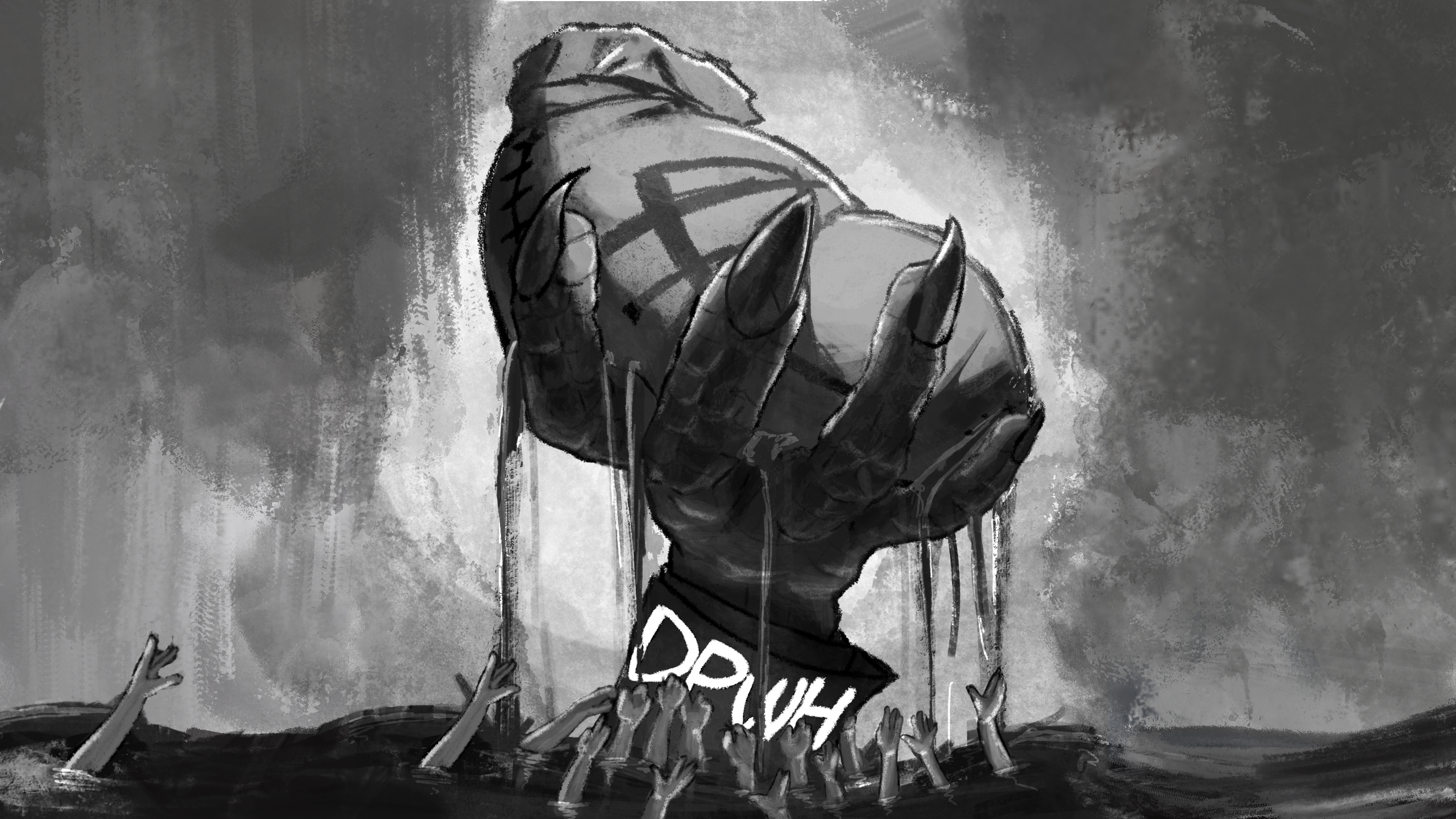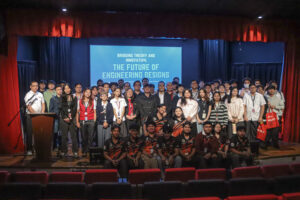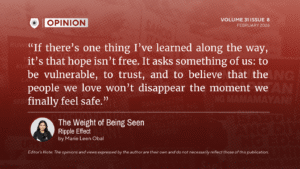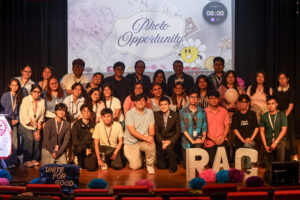Written by The Bedan Herald | September 10, 2025

Cartoon By Alexis Amion
Flood money to play money
As a country part of the Pacific Ring of Fire, the Philippines is not new to annual visits of Low Pressure Areas (LPAs), typhoons, storm surges, and sometimes even super typhoons. On average, Filipinos experience 20 tropical cyclones entering the Philippine Area of Responsibility (PAR) every year. The Department of Public Works and Highways (DPWH), the construction and engineering arm of the government, always receives one of the biggest slices of the country’s budget. However, year after year, from one typhoon to another, the same problem still persists. This grim and dark reality begs an important question: where does the funding go?
The answer lies behind the shadows of one of the biggest agencies in the government—DPWH. For years now, the agency has been familiar with the same controversy: corruption in its system. According to a report released by the Philippine Investigative Center for Journalism (PICJ), for the past 20 years the government was not (or at least, was unwillingly) able to stop corruption in the sector of public works. Every unfinished bridge, broken floodway, and uneven road makes you wonder why the government agency with one of the largest budgets every year fails to deliver its very mandate to provide infrastructure to Filipinos. Instead of using its budget to build, build, build, DPWH serves as a breeding ground for corruption, resulting in substandard projects, and a lack of accountability and transparency.
In his fourth State of the Nation Address, President Bongbong Marcos directed DPWH and the Regional Project Monitoring Committee to provide a list of all flood control projects under the president’s administration and identify the failed and non-existent projects. On Aug. 11, the President exposed 15 contractors who control 20 percent of the government’s flood-control projects since 2022. Despite all of this, members of Congress, some who are even allegedly tied to these contractors, remained silent, neglecting their duty to the very people that elected them. According to the Department of Finance, P42.3 billion to P118.5 billion were lost in the past two years due to corruption in flood control projects. Last Aug. 20, 2025, Senator Panfilo Lacson dropped a bombshell in his privileged speech — he claimed that almost P1 trillion was possibly lost due to corruption. Lacson explained how the budget for these projects were cut down due to kickbacks from government officials, politicians, lawmakers, and even personnel of the Commission on Audit—leaving behind almost only 40 percent for actual construction.
Most recently, in a Senate Blue Ribbon Committee Hearing, Rowena “Sarah” Discaya and her husband, Pacifico “Curlee” Discaya II named various members of the government to have alleged ties to corruption on flood control projects. Notable names include, House of Representatives Speaker of the House Cong. Martin Romualdez, and Cong. Arjo Atayde, 1st district Congressman of Quezon City. Just last Sept.10, Ex-DPWH official Engr. Brice Hernandez, names Senator Jinggoy Estrada and Senator Joel Villanueva to be also tied to corruption activities on various flood control projects.
Imagine, paying your taxes to the government and expecting to see projects and infrastructure that will improve your daily life, only to learn later on that it goes to the bottomless pockets of these shameless contractors and government officials. The Discayas, owners of Alpha & Omega Gen. Contractor & Development Corp. and St. Timothy Construction Corporation, among the contractors that the president called out, shared in an interview that they were able to buy 40 luxury cars because of their so-called earnings as contractors for DPWH. It's unbelievable how a construction firm working for the government is able to purchase luxury cars when Filipinos, on a daily basis, continue to fight tooth and nail, shedding blood, sweat, and tears just to simply make ends meet. It's infuriating how these shameless, privileged, individuals steal from the nation’s wealth right before our eyes.
The cost of this thievery however, cannot be merely measured by the billions, and trillions of pesos they stole from the people but in the impact it brings. People are presented with unfinished roads, broken bridges, and dysfunctional drainage systems. We have been so accustomed to this kind of treatment from the government that it has been a norm for many Filipinos to take matters into their own hands in preventing flooding. With trillions of pesos allocated to DPWH every year, we must be expecting a flood-free Philippines. But, what do we get? Time after time our streets are flooded because of poor and unfinished infrastructure. While Filipinos continue to be flooded, contractors, and government officials drown from their own greed and schemes as they steal billions of pesos from Filipinos. The money that is supposed to fund infrastructure projects to prevent flooding are used to sustain the lavish lifestyles of those sitting in power.
This glaring problem however, continues to persist when accountability and transparency continues to be missing. Day after day, allegations and news about corruption in DPWH, existence of ghost projects, and stolen billions from the budget make the headlines but, are people actually held accountable? Only a few cases, if not none, ever lead to conviction. Exposed politicians are placed in different posts, or cases against them are dismissed due to technical and bureaucratic issues. The padrino system perpetuates a system of impunity within our government. Instead of holding people accountable, they are shielded by powerful figures who heavily rely on them to provide campaign funds and secure votes during elections. A few elected senators today, those who should exercise the constitutional mandate of public office, is public trust allegedly have strong ties with contractors who have taken billions of pesos from DPWH projects.
The PICJ reported that Senator Francis “Chiz” Escudero, Senator Joel Villanueva, and Senator Christopher Lawrence “Bong” Go and Ako Bikol Partylist Representative Elizaldy Co have strong ties to contractors. These contractors serve as top donors for candidates during election season, and what do they get in turn? Protection against conviction. It's ironic how the very same institution conducting investigations is infiltrated with corrupt politicians right at its very core. Imagine, a corrupt lawmaker, questioning a fellow corrupt contractor in a hearing — only in the Philippines will you witness such a mockery to the people. We are living in a system controlled by those who are hungry for money, while Filipinos are left fighting over projects that kill instead of save them.
DPWH—a pillar and representation for progress now serves as a breeding ground for corruption. It's ironic how the agency responsible for the country’s infrastructure is the very institution that causes the cracks so the government drags it down. Every act of corruption, every peso stolen, is taken with a human cost: each broken bridge leads to deadly accidents, unfinished flood-control projects result in lives and homes lost because of typhoons, and every peso pocketed symbolizes the opportunity stolen away from Filipinos in its dreams of excellent infrastructure. The DPWH’s mismanagement of funds is not simply an act of corruption. It is a defiance of the trust given by the people to government institutions. If corruption ensues, public service loses its meaning.
With these in mind, it's crucial for the government to demand greater accountability and transparency on each of the government’s infrastructure projects. Every peso must be accounted, audited, and recorded. Information on the government’s projects must be easily accessible by anyone, anywhere, and anytime. Contractors and bidders must be checked properly and the existing culture of a padrino system must be abolished. Filipinos must see the fruit of the taxes they are paying transform into infrastructure used to improve everyday life. To eradicate corruption, the government must provide stricter enforcement of regulations within the department. It must cleanse itself from its familiar image of corruption. There must be stricter oversight on DPWH, with independent and external auditing inspections from time-to-time. As Filipinos now wake up from this grim nightmare of corruption, people are now holding those in power accountable by calling out children of government officials and contractors for their lavish styles, conducting rallies, and exposing the corrupt in social media. Soon, justice will be served and those responsible shall be put behind bars.
The foundations of the very democracy we enjoy today are not merely built on steel, nails, and concrete; rather, it is founded on the principles of trust, justice, and accountability. Without these ideals put into action, no bridge, building, or infrastructure will bring the progress of our country.
Volume 31 | Issue 3



